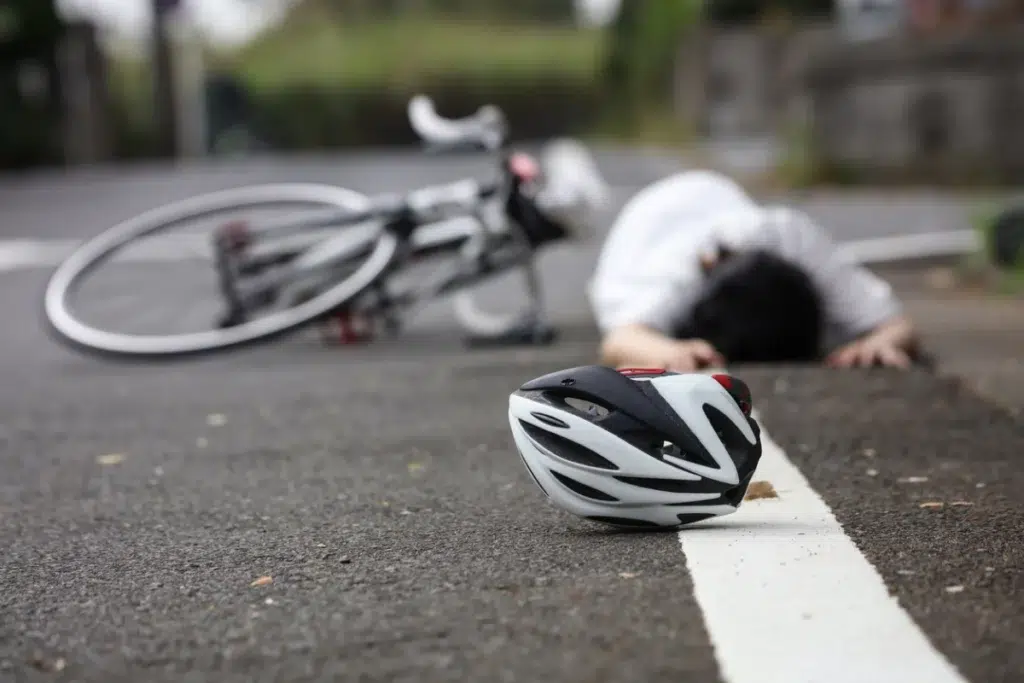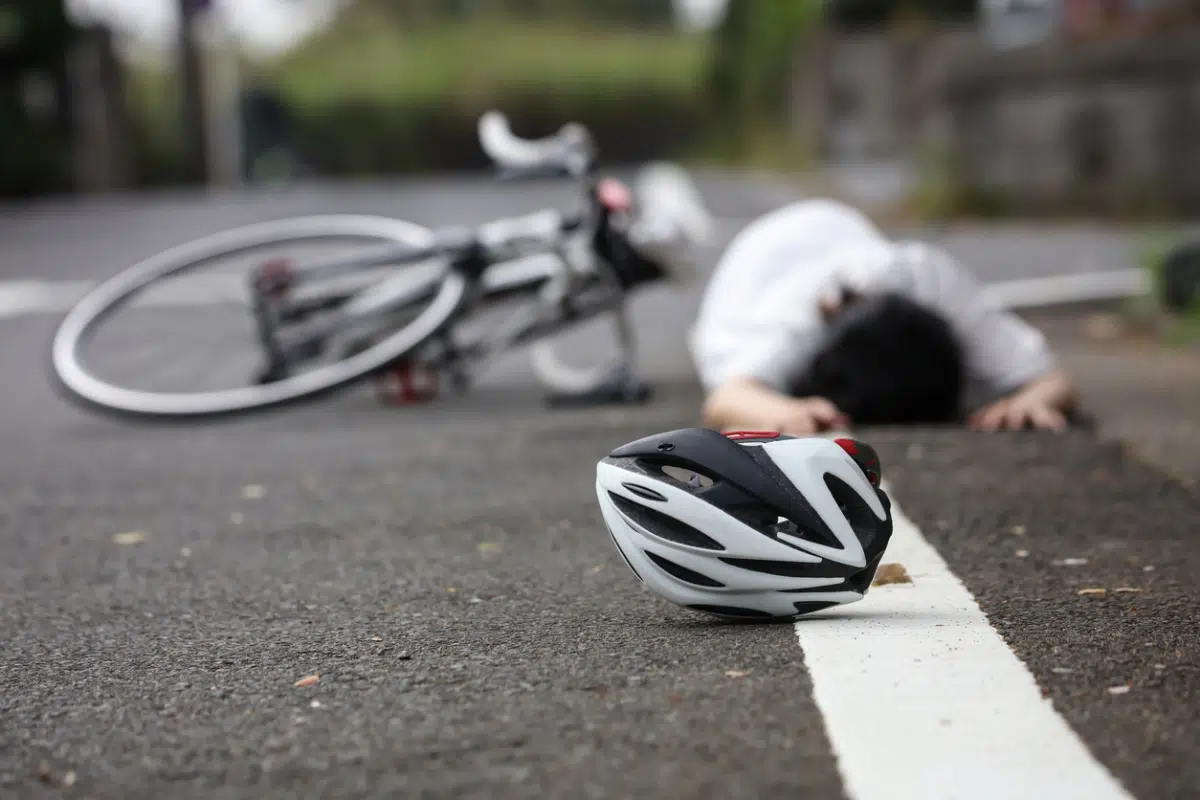
Traffic collisions are an everyday part of life in Illinois. No matter whether a crash happens in busy Chicago or in the rural parts of the state, it can be a stressful and traumatic event for those involved. The stress, anxiety, and trauma these people feel are only amplified when someone’s property is damaged or a person is hurt or killed.
No matter your emotional or mental state after a wreck, Illinois law prohibits you from driving away from certain accidents that result in property damage or personal injury. Even leaving the scene of an accident with a parked car in Illinois is a criminal offense that can lead to jail, fines, and other consequences.
These hit-and-run penalties in Illinois increase if you leave the scene of a collision where someone has been hurt or killed, or if you commit other crimes like DUI.
You might be wondering how serious a hit-and-run crime is. “Is hit and run a felony in Illinois?” you may be asking. Depending on the circumstances involved, you could be charged with and convicted of felony hit and run.
Therefore, hiring a defense lawyer who knows how to defend against a hit-and-run charge in Illinois is crucial for every driver, as no motorist is exempt from being accused of failing to take appropriate steps after a car accident.
When Is Hit and Run Considered a Felony in Illinois?
If you believe you fled the scene of an accident or have had charges filed against you, you might have a legitimate concern over how serious those charges are. For example, “Is hit and run with property damage a felony in Illinois?” is a common question motorists have, especially if they think they may have struck an unattended object without reporting it.
The Felony-Making Factors
Felony vs. misdemeanor hit and run in Illinois comes down to whether a few factors are present. If the hit and run accident only resulted in property damage to a vehicle involved or other property damage, any hit and run charge will be a misdemeanor. However, leaving the scene charges related to a hit and run accident that left someone injured or dead will be felonies.
Stopping at the scene of a crash is not enough, though. Illinois Statute 625 ILCS 5/11-403 also imposes additional duties you must complete once you have stopped at the scene of a property damage accident. Failing to fulfill legally imposed duties in the case of a crash resulting in personal injury or fatal hit-and-run accidents also constitutes a felony offense.
Felony Penalties for Hit and Run in Illinois
What happens if you flee the scene of an accident in Illinois, especially if someone is hurt or killed in the accident? Can you go to jail for hit and run in Illinois? The hit-and-run with personal injury in Illinois penalty could be prison, probation, fines, or some combination of these.
Failing to stop at the scene of an accident resulting in personal injury or death to any person is a Class 4 felony. The standard sentence you could face would be between one and three years in prison. However, under Illinois’ extended sentencing laws, the prison sentence could be as long as six years if certain aggravating factors are present.
Suppose that you do stop but do not notify the police of the accident or fulfill any of the other duties required under 5/11-401 within 30 minutes of the crash. The severity of the charge and the penalties you face depend on the amount of harm caused by the crash:
- If the wreck caused only property damage to another car or other object, the offense is a Class A misdemeanor and is punishable by up to 12 months in jail
- Those who flee hit-and-run accidents resulting in injury to any person without fulfilling their legal obligations will face Class 2 felony charges, which have a standard sentence of between three and seven years
- The legal consequences of failing to report an accident resulting in death can result in a Class 1 felony and face a standard prison sentence of between four and 15 years
Remember that the court can impose fines and other financial penalties in addition to sentencing you to jail or prison for leaving the scene of an accident. In addition, if you are facing other charges like DUI, your penalties for those crimes could be added on top of whatever the court sentences you to for leaving the scene of a crash.
Impact on Driver’s License
You will also face driving-related consequences if you are found guilty of leaving the scene of an accident in Illinois. Leaving the scene of a crash is a serious criminal offense, and the Illinois Secretary of State’s office takes convictions for this offense seriously. If you are convicted of leaving the scene of a bodily injury or property damage accident, your license will likely be suspended.
If you failed to stop or fled the scene of an accident involving death, your driver’s license will be revoked.
Civil Repercussions Beyond Criminal Charges
As if the criminal penalties for leaving the scene of an accident were not severe enough, you could also face incidental consequences just by being charged with a felony offense. Your employer may suspend or terminate your employment if you are facing felony hit-and-run charges, even if you are ultimately not convicted of them.
The likelihood of employment-related consequences only increases if you drive for a living, are found guilty of leaving the scene, or accept a plea deal.
Having a felony conviction on your criminal record can also make obtaining housing or accessing educational opportunities more challenging. As a serious traffic offense, it is generally not possible to seal a conviction for leaving the scene.
Finally, your insurance company could decide to cancel your policy for leaving the scene of a crash. Other insurance companies might not be willing to issue you a policy, or you can face increased premium costs if a policy is offered.
Immediate Steps to Take
The most effective way to avoid any penalties for hit and run in Illinois is to know your legal and other obligations following an accident and to fulfill them promptly. The steps listed below will not only ensure you satisfy Illinois law but also that your health, safety, and property are protected.
Legal Obligations After a Traffic Accident in Illinois
In most cases, Illinois law requires you to stop at the scene of any crash or as close thereto as you can without endangering yourself. This includes wrecks involving damage to unattended property and injuries to others. In the event you collide with an unattended vehicle or property belonging to someone else, including public property, you should:
- Stop your car as close to the scene as you can without impeding other traffic
- Notify local law enforcement about the crash
- Try to locate the owner of the damaged property
- If you locate the damaged property’s owner, provide that person with your name, address, and other contact and insurance information, and your vehicle’s registration number
- Alternatively, if you do not locate the property’s owner, secure a notice to the damaged property that contains this information
The law requires you to notify law enforcement about any accident that appears to cause $1,500 or more in property damage. If this threshold is not met, or if an officer does not appear to make a report, you should still report the crash. You can do this online in some cases or by visiting the nearest law enforcement center in person.
Suppose that you are involved in a wreck and someone is hurt or killed, including another motorist, bicyclist, or pedestrian. In this case, your legal obligations are more extensive:
- Immediately stop your vehicle, or stop as close to the accident scene as possible
- Call 911, report the accident right away, and remain on the line with the dispatcher until first responders arrive
- Render aid to those injured or killed as you are able and comfortable doing, but do not provide any first aid or medical assistance you are not qualified to give
- Do not move those injured or killed unless instructed to do so by a member of law enforcement or unless it is necessary to save that person’s life and you can do so safely
- Remain on scene and provide police and others involved in the crash with your name, address, contact information, and insurance information
- Do not leave the accident scene until you are released by law enforcement or taken away by ambulance
These steps must be followed in the case of any injury, no matter how minor it may appear. You must still fulfill the obligations listed above, even if the injured person insists they are “fine” or that the crash was “no big deal.”
Protecting Yourself and Your Interests
Beyond these legally required steps, consider the following, as these additional actions can make recovering compensation for any losses you experience due to another’s carelessness easier:
- Avoid discussing who caused the crash; instead, limit any statements you make to law enforcement to the facts of what happened
- Do not admit fault, and be careful about saying you are “fine” or not injured until you have seen a medical professional
- Take photographs of where the accident took place, including traffic lights and signs, obstructions in the road, debris, and skid marks on the pavement, and anything else that seems out of the ordinary
- See a medical professional for an evaluation to check for latent injuries, and take your vehicle to a repair shop for a damage estimate
Keep all paperwork related to your accident in a safe and secure place. It is also a good idea to document when you contacted the police and reported the accident.
What to Do if You’re Accused of Felony Hit and Run
Law enforcement officers may seek you out and ask to interview you if they believe you illegally left the scene of an accident. However, in many cases, you may not know felony charges are being considered until you are arrested or are served with papers. No matter how you find out about pending felony hit-and-run charges, take the matter seriously by:
1. Remaining Calm
Being charged with a crime, especially a felony like hit and run, can lead to anxiety and impulsive decisions. As much as possible, remember that criminal charges are allegations, albeit serious ones.
2. Retaining Experienced Legal Counsel
In this stressful moment, you need the advice and assistance of a calm, objective legal mind more than ever. Retaining an attorney early can help with your immediate concerns, such as getting released from custody if you were arrested. An attorney can also begin working on building your defense and resolving your case.
3. Do Not Talk With Police Without Your Attorney
Well-intentioned and innocent people routinely think that any charges they are facing are simply a misunderstanding that can be cleared up by explaining themselves to the police. Not only is this not likely to result in the immediate dismissal of your case and your release from custody, but it can also make successfully resolving your case more difficult.
If the police want to ask you questions about the accident, inform them you want to speak with your attorney first.
4. Cooperate With Your Lawyer
The best outcomes in criminal cases are achieved when clients and their defense lawyers collaborate on a solution to the client’s charges. You can do your part by communicating with your lawyer about your questions and concerns, promptly returning all documents, and discussing the facts and circumstances of the crash as you remember them.
Do not assume that because your attorney is an experienced professional that they can take care of your case without your input. Discussing your goals and objectives with your lawyer and making sure they have the information they need to evaluate your options is essential.
Resist the urge to enter a plea to any felony hit-and-run charge until you have talked with your traffic defense lawyer about your options. A hasty plea can lead to criminal and other consequences that will complicate your life for years to come.
With a three-year statute of limitations, hit and run in Illinois is a crime that can be charged long after the accident occurs. If you suspect you might face hit-and-run charges following a crash, it is best to reach out to a knowledgeable and reputable attorney.
How Legal Guidance Can Make or Break Your Case
You may know that you fully complied with the law and that you did not illegally leave the scene of an accident. Unfortunately, overzealous prosecutors and police officers can be more fixated on obtaining a conviction than on uncovering the truth. An attorney is essential for ensuring your story is told and the truth prevails in court. Your lawyer can:
- Review police reports and other evidence from the prosecution for errors, omissions, and weaknesses
- Conduct an independent investigation into the facts of your crash, including talking to eyewitnesses or reviewing evidence the police may have missed
- Suppress evidence and statements that police obtained by violating your constitutional and statutory rights
- Challenging officers and witnesses in court who are accusing you of leaving the scene of an accident
- Appearing in court with you at all hearings and speaking on your behalf to the court
There are complicated rules regarding how evidence and testimony must be presented in court. Moreover, there are deadlines whereby you must take certain actions or else you give up critical rights and legal protections.
If you are representing yourself in your hit-and-run case, you are expected to know and follow these rules and requirements. Neither the court nor the prosecutor can help you.
By hiring a seasoned defense lawyer, you are giving yourself a voice in court. Your attorney is your advocate who fights for your rights and freedom, preventing the prosecution from taking advantage of your missteps and ignorance of legal procedures to secure a conviction.
Having an attorney working for you helps ensure the prosecution fights fair and follows the law when prosecuting your case.
Contact Kostopoulos Law Group for Help With Hit-and-Run Charges
Although the law’s demands are clear, being charged with leaving the scene of a crash does not mean you do not have viable and effective hit-and-run defenses in Illinois. Is hit and run a felony in Illinois? Whether your case is a misdemeanor or felony, you deserve a vigorous and well-informed defense and to know what your options are when facing hit-and-run charges.
Contact Kostopoulos Law Group immediately, and we will help you address leaving-the-scene charges confidently.





